American Hospital , Neuilly-sur-Seine
This is a tale about how World War Two in Paris came to and end under Mahaut de la Noue’s bed. It is, in this way, also about the conflicts, conversations, and interactions between Americans, French and Germans in the quiet (except for the avenue Charles de Gaulle) Parisian suburb of Neuilly. Indeed, during World War II, the Germans, seduced by the beauty of Neuilly, turned this quiet town into a crucial center of German operations and residence. More importantly it is here, at the American Hospital, August, 1944, that Mahaut de la Noue, recovering from lower-back surgery at the American hospital, disovered fragments of the last, violent shudders of the war under her bed.
Neuilly-sur-Seine
(www.aboutfrenchproperty.com) 4 Aug 2014
In mid-century Neuilly sur Seine, was—and still is–one of the most desirable neighborhoods right outside of Paris. Adjacent to the lush green spaces of the Bois de Boulogne and with the Arc de Triomphe easily visible, even walkable, from much of Neuilly, it is small wonder that, over the course of the nineteenth, twentieth, and twenty-first centuries, this neighborhood attracted prosperous French citizens, American expatriates, and, during World War Two, the German military, many of whom chose to die, as well as live there. But they are not buried in the cemetery of Neuilly (actually just outside of Neuilly) at La Défense, despite its international flavor. This is where Bette Davis, François Truffaut, Aristotle Onassis, Screamin’ Jay Hawkins, Wassily Kandinsky, Gertrude Stein, Marcel Duchamp, and Pear White—the star of The Perils of Pauline films–chose as their final destination. It is a quite lovely cemetery, which like most French cemeteries, looks like a mini city with its neat blocks of granite tombs topped with little roofs, but just as Neuilly is greener than Paris, so this cemetery is greener than the Père Lachaise. (www.imdb.com, “Most Popular People who Died in Neuilly-sur-Seine France”).
This blog, however, is more about those who were working and convalescing in the area of Neuilly. The French, of course, had long been there, but the Americans first established a prominent foothold with the creation of the American Hospital in Neuilly, completed in 1909 and inaugurated in 1913 by President Taft. The hospital was created to serve ailing American of tourists, students, and expatriates who had been drawn to Paris and fallen ill there; in fact the charter required that it provide free service to Americans, although of course one paid extra for private rooms. (www.american-hospital.org 4 Aug. 2014; Americans in Paris p. 71).
During World War II the hospital remained in operation, but already by 1938 the Hospital’s Board of Governor’s offered their services to French soldiers should war break out. Inevitably, too, the governance of the hospital, at least officially, changed from an American to a French governing body once the United States declared war on Germany in December, 1941; but if it was now primarily staffed by French doctors and nurses, it kept on many of the American doctors and nurses who had opted to stay in Paris during the war. Taking on Red Cross status, the hospital catered primarily to Canadians, French and the few Americans who stuck the war out–including injured American and Canadian airmen and French Resistance fighters whom it smuggled in and out. The director of the hospital since October 1940, Sumner Jackson, was able to keep Germans out of the hospital during most of the war by finding ways to fill hospital beds with French and Americans. The American Hospital itself was a strange island of non-Germans within the German occupation, for, as Mahaut notes, “The hospital was surrounded by the German police.” (Charles Glass, Americans in Paris 72).
Neuilly was the last district of, and surrounding, Paris to surrender to the Allied troops in 1944, which is why, days after the Allied army had entered Paris, Mahaut de la Noue, following doctor’s orders to remain quiet and calm in her hospital beds, found herself to be one of the few Parisians still inhabiting German-occupied France.
I like to think of the young Mahaut as a kind of allegory for the often imperturbable Parisian spirit under their years of German occupation. But there was, of course, also fear and anxiety. Here, as in most of Paris, the expectation of imminent liberation was accompanied by rumors that Hitler had ordered Dietrich von Cholitz, the city’s German military governor, to destroy Paris rather than surrender it to the Allies. And there were immediate anxieties as well. For Mahaut “our terror was that of being without water. One always needs water.”
They were not, of course, alone in their fear. As one New York Times reporter–who left in March of 1944 as part of an exchange of Germans and Americans–wrote, “The Paris air is more highly charged with menace than at any time since the French Revolution. Invasion, civil war, siege, famine, prison–whatever form the future may take–Parisians are minutely expecting the deadliest phase of the war” (Americans p. 351). News of an imminent allied landing didn’t help, as this key moment was preceded, throughout the spring of 1944, with the constant and oppressive sound of R.A.F. and Allied Air Force bombings, alternating with the screams of air raid sirens. Although central Paris itself was not bombed, the planes were close enough, targeting the industrial neighborhoods just outside of the city, with bombs landing in Montmartre and quite close to Mahaut in the sixteenth-arrondissement. Terror only grew from the fact that evacuation was difficult; lack of food rations could lead to starvation, transportation was limited, and the advance of German troops threatening trainsmade evacuation more risky than staying put.
But two things kept working. As Mahaut notes, “They didn’t cut the water supply; they didn’t cut the telephones. We thought about it afterwards; they could have cut these off. We think that the doctors worried that the loss of water meant that they could not keep the hospital disinfected. We did have electricity. I think that they had what they needed to generate their own electricity.”
Von Cholitz may be the hidden hero, or anti-hero of this narrative. He certainly did not have a record of being a humanitarian, but the fact appears to be that Hitler asked von Cholitz to destroy Paris—to leave it as utterly desolated and ruined as Stalingrad and Warsaw had been left, and von Cholitz chose not to obey that order. Some people state that von Cholitz was a pragmatist who knew that there would simply be no political or strategic benefit to destroying Paris; others say that von Cholitz simply loved Paris too much to watch it destroyed. Perhaps the latter suggestion was true; we do know that Von Cholitz quietly returned to Paris in 1956, revisiting his wartime headquarters, the Hotel Meurice. Whatever the motive, Parisians and those outside of Paris remain grateful that, at the end of the war, Paris, unlike Caen, Dresden, or London, looked pretty much as it did before the war.
Von Cholitz was not the first to save Paris, but his act has been the most remembered. When the Germans entered Paris in June of 1940, the French government–having evacuated–left Paris to the American ambassador, William Bullitt, in part the Germans would only negotiate with a nation with which they were not at war. Bullitt was essentially the default governor since, according to a telegram he wrote on June 10 to the Secretary of State, “This Embassy is the only official organization still functioning in the City of Paris except the Headquarters of the military forces, Governor and the Prefecture of Police” (Charles Glass, Americans in Paris, p. 15). General Georg von Küchler of the occupying army, angered by a French sniper, gave orders for an “all-out artillery assault on Paris.” With telegraph lines cut by the Frenach, Bullitt scrambled to get a phone line open to Berlin, asking the government to recognize that Paris had been declared an Open City.” Fortunately Bullitt succeeded.
Imprisoned in London after the war, von Cholitz was taped (unknown to him) saying to his fellow prisoners, referring to Hitler and Nazi Party members, “We all share the guilt. We went along with everything, and we half-took the Nazis seriously instead of saying, ‘to hell with you and your stupid nonsense’. I misled my soldiers into believing this rubbish. I feel utterly ashamed of myself. Perhaps we bear even more guilt than these uneducated animals.” (www.wikipedia.org).
But during the last days of the war, there was no way of knowing if Paris would be saved, as Mahaut lay quietly in her bed, hoping for daylight, the time when she could read. Electricity there was, but it was mainly reserved for surgeries, sanitation, and other crucial aspects of the hospital, so Mahaut only had an hour or so of electricity per day in her room. Fortunately, it was late summer, so there was plenty of daylight for Mahaut to read what turned out to be forbidden books.
“When I was in the American Hospital, they gave me books to read, in American. They were detective novels. They kept me entertained and I learned that steam came out of the sidewalks in New York; how to break into houses., and so on. So when I arrived in New York, I knew how to break in, even through windows, and then, when my mother got upset and nervous at seeing smoke come out of sidewalks, I was able to say, ‘Don’t get into a panic—it’s not serious; it’s normal, it’s normal.”
But Mahaut’s doctor severely limited even this one pleasure; the interchange went something like this:
Doctor: “but who gave detective novels to this child who is supposed to stay as calm as possible? Not with a detective novel! “
Mahaut: So they gave me kids’ books instead. Well, I had no idea how horrible fairy tales were….. And there was a book that made me cry…”
Terry: was it American, this book?
Mahaut: yes, but it was no better, and it had ghosts to boot.
Outside of horrible fairy tales and maybe an hour a day to listen to the radio, Mahaut had few distractions. The nurses and doctors were too busy tending to the many wounded flooding the hospital in the last days of the war to pause to chat with her. But Mahaut did get visits from family members who were hardy enough to cross the phalanx of soldiers at the doors of the American Hospital, soldiers who certainly did not terrify Mahaut’s indomitable mother. Madame de la Noue, who came to visit on her bicycle one day with a little basket attached in front. She was of course, stopped by one of the soldiers, whose duty was to check her belongings. One soldier asked, “But what do you have there in that basket?” It was a very small basket. “A terrorist,” she joked. He gave her a half-exasperated look, checked inside the basket, just in case, and found a puppy. Fortunately, as Mahaut commented, Germans love animals—who doesn’t love puppies? So they let her in with the puppy.
The bored, recuperating Mahaut petted the playfully nipping puppy, as her mother caught her up with news. “Leclerc is already about to enter Paris; we’ve seen the first tanks of his armies arriving already.” “So,” adds Mahaut, “we thought that the Germans in Neuilly would surrender at any moment.”
But Neuilly was not surrendering; instead, more and more young, exhausted, traumatized German soldiers–the dregs of the war–were arriving from Normandy, having escaped the horrors of the Falaise Pocket offensive of August 12-21. Here the Fifth and Seventh Panzer armies of the Germans were encircled by allied troops, a battle which led to the destruction of the majority of Germany’s forces west of the Seine. Yet the Germans did not decamp, having been forbidden to retreat by Hitler. According to Wikipedia, “Historians differ in their estimates of German losses in the pocket. The majority state that between 80,000 and 100,000 troops were caught in the encirclement of which 10,000–15,000 were killed, 40,000–50,000 taken prisoner, and 20,000–50,000 escaped.” (Falaise Pocket. May 28, 2014). Eisenhower, touring the area after the battle, had this to say: “The battlefield at Falaise was unquestionably one of the greatest ‘killing fields’ of any of the war areas. Forty-eight hours after the closing of the gap I was conducted through it on foot, to encounter scenes that could be described only by Dante. It was literally possible to walk for hundreds of yards at a time, stepping on nothing but dead and decaying flesh” (http://ww2db.com/battle_spec.php?battle_id=112; May 28 2014).
This is how Mahaut remembers it, “For the Germans, this represented a loss of men equivalent to that of Russia at Stalingrad.” She notes that the Germans were surrounded by “the Canadians, The English, and also the French… The Germans arrived traumatized and exhausted because they were always hiding from airplanes. They arrived at Neuilly at night. “
Throughout it all, Mahaut, all-but abandoned in her quiet, civilian, wing of the hospital, slept peacefully in her separate civilian wing of the hospital. Six months earlier Max Shoop, a governor of the hospital, had sent a telegram to Nelson Dean Jay, the hospital president in Washington, DC., in which he described the hospital as follows: “1st floor occupied French soldier patients, next 2 reserved civilians, 4th floor west terrace built into few patients rooms, food problem difficult but same old Chef also still there, … not one window broken.” (Americans p. 341). The telegram, not surprisingly, keeps quite about the basement where Dr. Jackson routinely gave safe haven to American or British soldiers who had been shot down and survived. Generally, after attending to them, Jackson listed them as missing or having escaped, when in fact he was part of an efficient, organized Resistance network that was spiriting these airmen out of France. The network created the kind of alliances that crop up during war, as French customs officers and smugglers worked together for one to smuggle airmen out of France and into Spain. Perhaps one of my favorite stories about this operation was told by an Texas airman to at Herald Tribune reporter in 1944. “at Toulouse there were police at the station asking everybody for identification papers. We just showed them our American cards, and they handed them right back without batting an eyelash. They were French, of course. Still, it was a terrible moment.” An illustration of French sang froid.
As Mahaut remained dutifully calm upstairs in her civilian wing exhausted nurses tended to the German wounded arriving from the battle of the Falaise pocket. Oblivious to cries for nurses, cries of pain, or the screechy noise of beds being wheeled from room to room, she dreamed that she was out in the countryside in the Côte d’Or in Burgundy, probably wandering about isolated farmhouses and châteaux, vineyards and poplars. Behind the dream were thoughts of cousins living there, not far from the line of demarcation, the area that marked the boundaries between German occupied France and the French Free (or not-so-free) zone.
Mahaut: Then suddenly I thought, “Be careful, it smells like Germans here.” Nonetheless, the smell woke me up and I noticed there were strange noises under my bed.”
Terry: “The puppy?”
Mahaut: “On no, not the puppy; he returned home on the bicycle with my mother. No, it wasn’t a puppy; it was Germans.”
Terry: “Woah!”
Mahaut: “So, not knowing any German at all, I did know to say “Heraus” (Scram!), then in French “Foutez-le-camp! Foutez-le camp!” (Scram! Take a hike!) The electricity was out, so I couldn’t ring the bell for the nurses. And I wasn’t allowed to get up, as I was still recovering from surgery. Finally a nurse coming by heard me and poked her head in.”
Nurse: “Oh has it been a while since we checked on you? Well, since you’re normally so calm, … you know, we’ve been overwhelmed because the hospital is filled with wounded Germans.”
Mahaut: “Yes, but I, I have some of those Germans under my bed. I don’t know how many there are.”
Terry: She believed you?
Mahaut: “Well, she just had to crouch down to look. Of course she believed me, since I was known to be the calm one. So I said, ‘So, I’ve argued with the Germans; I told them ‘Heraus.’ I thought that would do it, but they wanted to stay. They told me ‘pompe’ (gasoline pump), ‘avion’ (airplane), all of that. I told them, ‘But you’re Germans; you don’t have any reason to… you don’t need to be afraid here. Stupid!’”
Terry: Well, they had a point.
Mahaut: The Germans thought the bombs were of the allies. So I told them, ‘You’re Germans; what does this matter to you? They realized that a young girl was making fun of them.” The next day some German officers came to apologize.
So, the Allied invasion of Normandy moved south to Paris and under Mahaut’s bed. And from her bedroom Mahaut heard about, and watched, the fall of the German empire in Paris.
“They had set the wine reserves on fire nearby—right at the edge of Paris; it burned up immediately. And I could see airplane battles in the sky. I saw airplanes fall from the sky like drops of water. They fell, in flames, over Bercy (in the southeastern corner of Paris). And Bercy had all the wine reserves for the city of Paris, reserves that were being guarded zealously in preparation for the celebration of the liberation of Paris. I remember also, there was a plane—a Spitfire—chasing after a German airplane. They passed right by. I had an upstairs room with bow windows. I couldn’t resist; I went to look. And there was the dogfight, right at the level of the bow windows. And I saw the German who was turning his airplane and who couldn’t see. And at one point he must have jumped with his parachute, as the plane caught fire in front of me! All of this happened quite quickly. He was able to jump; the nurses went to get him. He had broken his legs, but that’s all.”
From her hospital room Mahaut also saw the surrender of the last of the German soldiers in the Paris area.
In another illustration of the difficult of separating French from German, good from bad during this time, Pierre Laval one of the leaders of the pro-Nazi Vichy government, was part of this confused mix. His daughter, Josée Laval, had married Laval’s son, René, back in 1935, a wedding attended by President Teddy Roosevelt’s famously outspoken, independent daughter Alice Roosevelt Longworth. René’s mother, Clara, had stolidly kept the American Library open during the war with help from equally steadfast volunteers, and,as Mahaut notes, Clara’s wife, Laval’s “father-in-law, was part of the committee which oversaw the American Hospital because he was part of the group of friends descended from those who had aided the Americans in the American Revolution.
Laval’s own political origins had changed considerably over time. The son of a poor family, he was at first a socialist, then an independent, moving more to the right as he grew richer in his professions of lawyer and politician. In 1931, he became Prime Minister and soon became the first French Prime Minister to visit the United States, earning the title of “Man of the Year” from Time magazine as a result.
And so he made an agreement with the Germans to surrender, and my mother went to watch because there was a group of angry men who threw down the weapons in a large pile and there was one huge German who began breaking rifles as he could. It’s not easy to break a rifle.” (information not from Mahaut is from Americans, 44).
Terry: No.
Mahaut: But he was so angry, and then they added, “We don’t want to surrender to a bunch of written notices; we want to surrender to soldiers.” So, then they asked the Leclerc division to arrive with a tank, and then the German soldiers deposited the rest of the rifles by the tank.
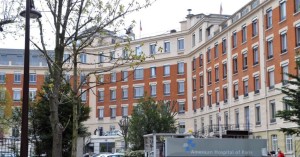
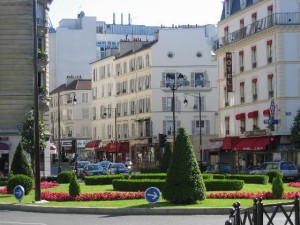
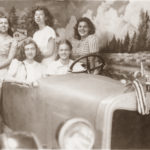
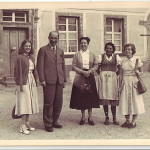
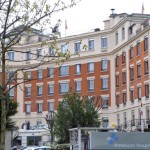
Recent Comments